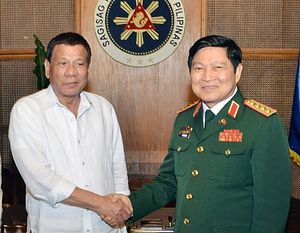Last week, Vietnam and the Philippines held the fourth iteration of their deputy defense ministerial dialogue. Though the interaction was just one among several between the two Southeast Asian states, it nonetheless highlighted ongoing efforts by Hanoi and Manila to continue to explore areas for security collaboration in spite of the challenges in this aspect of the relationship.
As I have observed previously in these pages and elsewhere, Vietnam and the Philippines, two Southeast Asian states who are also claimants in the South China Sea disputes have long maintained a defense relationship as part of their wider relationship, which had been elevated a strategic partnership back in 2015. And though challenges such as Philippine President Rodrigo Duterte’s outreach to China have posed challenges for ties, both sides have nonetheless continued to try to make progress on some aspects of ties, including exchanges between officers and better managing issues such as illegal fishing.
One of the mechanisms that both sides have developed within their strategic partnership is a Vietnam-Philippines Defense Dialogue. The Dialogue, which was intended to be held at the defense ministerial level on an annual basis alternating between both nations, was first held back in 2015. The last iteration was held last year in Hanoi by the two countries amid broader efforts to recalibrate the security aspect of ties.
Last week, the defense aspect of the relationship was in the headlines again with the holding of the fourth iteration of the Vietnam-Philippines Defense Dialogue. The Dialogue took place in Manila from August 6 to 8 and it was co-chaired by Vietnam’s Deputy Defense Minister Nguyen Chi Vinh and his Philippine counterpart Cardozo M. Luna.
Per the official account of Vietnam’s defense ministry, as is usually the case with these meetings, both sides reviewed developments and also talked about regional issues of common interest, which included major power competition, terrorism, maritime security, and the South China Sea issue. Both sides also discussed ways to improve their defense collaboration as well by implementing existing agreements and dialogue mechanisms as well as enhancing cooperation in specific areas such as exchanges, cooperation among forces operating at sea, addressing the issue of illegal fishing, and supporting each other at ASEAN-led institutions, particularly with Vietnam taking over the ASEAN chair in 2020.
Unsurprisingly, not much was publicly disclosed about the private deliberations between the two countries, and little was said about the lingering challenges that remain for advancing ties in this realm. Nonetheless, the development nonetheless showcased the ongoing efforts by two strategically significant Southeast Asian states to continue to advance security ties amid wider regional trends and domestic developments.
































